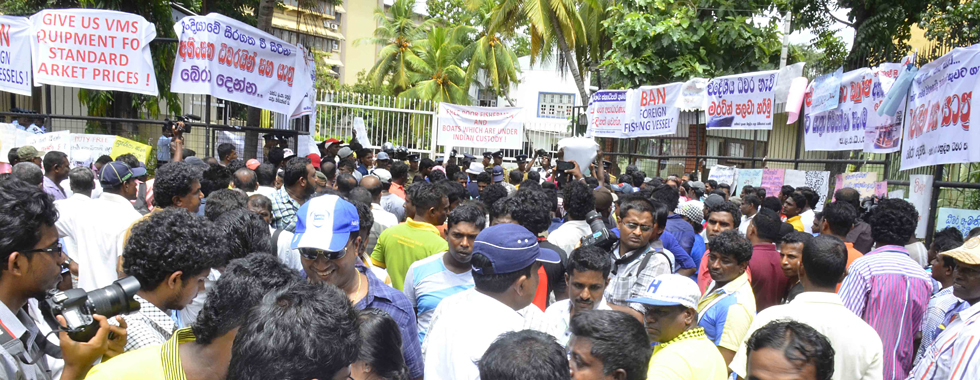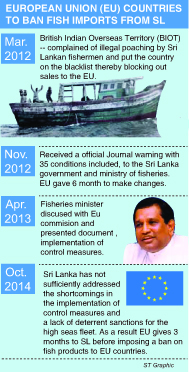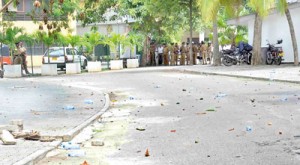News
Fishermen want probe into big timers’ practices posing threats to their jobs
Fisheries associations have asked President Mahinda Rajapakasha to probe allegations that large vessel operators were involved in illegal unreported and unregulated fishing methods posing a threat to the jobs of thousands of fishermen.
The request came during a 90 minute meeting with the President at Temple Trees where fisheries association representatives raised a range of issues of the fishermen in view of an impending ban by the European Union on Lankan fisheries products to EU countries from January 15, 2015 onwards.

Scenes of the protest and subsequent melee that left at least four injured
The meeting came after fisheries association representatives were pelted with stones from within the Fisheries Ministry premises when they arrived at the Ministry last Monday to call on authorities to take immediate action to avert a possible ban by the EU on fish exports to its member countries. They held placards and banners calling on the Government to take action against foreign vessel owners who register their ships under the Sri Lankan flag and get involved in IUU fishing practices.
All Ceylon Fishermen Trawlers’ Association president Warnakulasuriya Sujith told the Sunday Times that they arrived at the Ministry to meet Minister Rajitha Senaratne and ascertain what measures are being taken by the Government or the Ministry to avoid a ban on fish exports.
‘As we arrived at the gate of the Ministry at Maligawatte we saw fisheries harbour employees waiting inside the Ministry premises. They were employees of the Mutwal fishery harbour. When we began protesting outside the gate displaying placards and calling for a discussion with the minister, stones were pelted at us. At least four persons were injured’, he said.
He said the Police intervened and the gathering dispersed to avoid further tension.
 Mr. Sujith said that on October 7 they had met the minister and queried about the EU Red Card warning. The Minister had claimed that the warning was due to the trawler owners failing to install vessel monitoring systems and venturing into restricted areas. He said that the Minister had claimed that the trawler owners were using illegal fishing methods.
Mr. Sujith said that on October 7 they had met the minister and queried about the EU Red Card warning. The Minister had claimed that the warning was due to the trawler owners failing to install vessel monitoring systems and venturing into restricted areas. He said that the Minister had claimed that the trawler owners were using illegal fishing methods.
He said the minister insisted that the fishermen purchase vessel monitoring systems by paying Rs. 500,000 for each, but the equipment was available in Singapore for Rs. 160,000.
‘The minister told us that the vessel monitoring system requires that the ministry had to install towers and needs officials to communicate with the trawlers. We explained that we cannot incur that kind of expenditure’, he said.
The Sunday Times learns that some of the fish exporting companies had purchased 50 vessel monitoring systems from Canada and donated them to the Fisheries Ministry to be distributed among the trawler owners. However the equipment has not been distributed while eight of them had been allegedly fitted to boats owned by a close relative of a politician.
He said that they had information that the foreign vessels operating under the Sri Lankan flag may shift to another country if the ban on fish exports is imposed by the EU next year.
Following Monday’s attack on the fishermen, a complaint had been lodged with Fisheries Deputy Minister Sarath Kumara Gunaratne who assured them the grievances would be looked into. Accordingly a meeting was summoned by Mr. Gunaratne where the fishermen’s representatives met with Ministers Milroy Fernando and Dayashritha Tissera and MP Arundika Fernando.
“There were allegations that the fishermen involved in the protest were JVP members, but they were all fishermen known to us. Most of them were from fishing areas such as Negombo, Puttalam, Kalpitiya and Chilaw. They are not affiliated to any political group”, Mr. Gunaratne told the Sunday Times.
“I am sorry that the fishermen who came to our ministry were assaulted”, he said.
Mr. Gunaratne said one of the reasons for the suspicions of the fishermen regarding foreign vessels was due to there being no transparency in signing the agreements with these companies.
“The EU warning is due to the use of unauthorised fishing methods. If these practices are not stopped thousands of our fishermen will be out of jobs and the Government will have to feed them”, he said.
Mr. Gunaratne said that some of the foreign vessels for which licences were issued were well equipped. “They have the capability of catching, in one hour, the same quantity of fish caught by one of our local fishing vessels in one day,” he said.
“As a result when our fishermen go into the fishing grounds there are no fish for them. They spend about Rs. 300,000 for a journey which lasts about one month. But they do not recover the money spent. Therefore, naturally, they are against granting permission to foreign vessels”, he added.
The deputy minister said the threat was earlier posed by Indian fishermen who were involved in poaching, but now it seemed that the foreign vessels were a bigger threat to the local fishermen.
Fisheries Ministry Secretary Dr. D.M.R.D. Dissanayake told the Sunday Times that permission granted to foreign vessels to use the Sri Lankan flag was done in a legal manner.
In November 2012 the EU issued a warning to Sri Lanka that it was not complying with international rules on illegal fishing.
The European Commissioner Maria Damanaki on October 14 in a statement said “Two years later, not much has changed. The same problems are still there and are even getting worse. Sri Lanka is now authorising huge vessels to fish in the Indian Ocean without marine GPS (VMS). This renders control totally impossible.
“Sri Lanka is the second biggest exporter of fresh and chilled swordfish and tuna to the EU (74 million Euro worth of imports in 2013). In the circumstances, we cannot be kept in the dark whether the fish imported to the EU was caught sustainably or not. EU citizens have the right to know what is on their plate,” the statement added.
Meanwhile an EU spokesperson in Brussels told the Sunday Times that the main shortcomings identified relate to lack of adoption of an adequate legal framework in the fight against illegal fishing, lack of control including the worrying example that Sri Lanka is authorising vessels to fish in the Indian Ocean without marine GPS (VMS) which makes it impossible to control the activities in their waters, lack of a deterrent sanction scheme for the high seas fleet and non-compliance with international obligations (IOTC), recommendations and resolutions.

